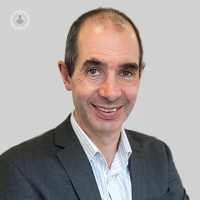What to expect after a colonoscopy?
Written in association with:Have you been told that you need a colonoscopy? A colonoscopy allows your doctor to take a look at your colon and rectum to find cancer or polyps. It is a safe examination with very few risks. Dr John Martin tells us a bit more about what to expect after a colonoscopy and what recovery looks like - including how long it takes to have a normal bowel movement afterwards.

What will happen after the procedure?
Patients may be sedated during a colonoscopy and often require some time to recover from the medication. After a colonoscopy, the patient will be taken to a recovery area for a period of observation. Here they can relax and will be given something to eat and drink.
How long is the recovery?
If a patient has had no sedation, recovery is almost instantaneous. However, with sedation recovery time may be longer. Although the patient will often feel very little of the side effects of the medication, on leaving the hospital, they must not drive, drink alcohol, operate heavy machinery, or sign any legal documents within the subsequent 24 hours, after which the drug will have left the body.
What symptoms can I expect after the procedure? How long does it take to have a normal bowel movement?
Patients may experience abdominal bloating and gas after a colonoscopy. Their bowel movements may take two to three days to return to normal.
Is there any pain after the procedure?
Some patients may get mild cramps after the procedure, but these usually settle within an hour. It is very rare to develop severe pain, but if this occurs, they should return to the hospital to seek medical advice.
Is bleeding after a colonoscopy normal? How much blood is too much?
Bleeding will not occur after a diagnostic colonoscopy. If the colonoscopy was accompanied by another procedure, such as a biopsy or the removal of polyps, some patients may see a small amount of bleeding, but this is not a cause for concern.
Heavy bleeding is rare but may be the sign of a problem. If this occurs, the patient should seek medical help.
What are the possible complications after the procedure?
Very rarely patients have a reaction to the sedation medication. Elderly patients or those with lung problems are at greater risk and your doctor will assess this risk prior to the procedure and will reduce the levels of medication appropriately.
Heavy bleeding, needing a blood transfusion, may occur in patients who have had a polyp removed, although this is in only one out of 2,400 patients. Perforation, or damage to the bowel, may also happen, with about one in 1,700 patients having this complication.
Are there alternatives?
Patients who don’t want to be sedated may have a CT colonoscopy, an examination that involves taking a special X-ray scan of the colon. As with a colonoscopy, the colon needs to be emptied beforehand, and if a polyp or cancer is found a colonoscopy will be required to remove it or take a sample.
Although slightly uncomfortable, a colonoscopy can effectively diagnose colorectal cancer at an early stage. The examination can also find and remove polyps, thus preventing the development of cancer. Complications after the procedure are extremely rare, but if you feel unwell, experience severe pain or significant bleeding after a colonoscopy, call your doctor immediately.
For more information or to get in touch with Dr John Martin, please visit his profile.


